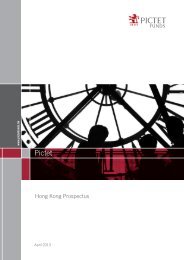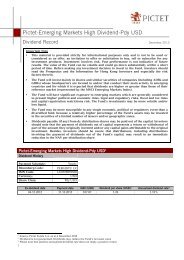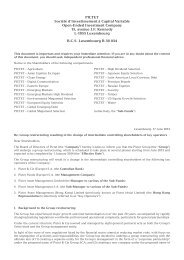Pictet Funds Hong Kong
Pictet Funds Hong Kong
Pictet Funds Hong Kong
You also want an ePaper? Increase the reach of your titles
YUMPU automatically turns print PDFs into web optimized ePapers that Google loves.
created to meet specific needs that cannot be met from the standardised financial instruments available in the<br />
markets. Structured products can be used as an alternative to a direct investment; as part of the asset<br />
allocation process to reduce risk exposure of a portfolio; or to utilise the current market trend. A structured<br />
product is generally a pre-packaged investment strategy which is based on derivatives, such as a single<br />
security, a basket of securities, options, indices, commodities, debt issuances and/or foreign currencies, and to<br />
a lesser extent, swaps. An investor's investment return and the issuer's payment obligations are contingent on,<br />
or highly sensitive to, changes in the value of underlying assets, indices, interest rates or cash flows. It is<br />
possible that adverse movements in underlying asset valuations can lead to a loss of the entire principal of a<br />
transaction. Structured products (regardless whether they are principal protected or not) in general are also<br />
exposed to the credit risk of the issuer.<br />
General description of Settlement and counterparty risks associated with over-the-counter (“OTC”)<br />
transactions<br />
The Fund and its compartment(s) may from time to time utilise both exchange-traded and OTC derivatives as<br />
part of its investment policy and for hedging purposes. Some transactions in FDIs by the compartment(s) may<br />
be entered into with counterparties on an off exchange basis, more commonly referred to as over the counter<br />
(OTC) transactions. Transactions in OTC derivatives, such as credit derivatives, may involve additional risk as<br />
there is no exchange market on which to close out an open position. OTC transactions also expose the investor<br />
to counterparty risk. In the event that the counterparty to the transaction is unable to meet or otherwise<br />
defaults on its obligations (for example due to bankruptcy or other financial difficulties) the relevant<br />
compartment(s) may be exposed to significant losses greater than the cost of the FDIs. In respect of a default<br />
on a foreign exchange transaction, it is possible that the entire principal of a transaction could be lost in the<br />
event of a counterparty default.<br />
Liquidity risk<br />
When market conditions are unusual or a market is particularly thin the compartment may encounter<br />
difficulties in valuing and/or selling some of its assets, in particular to satisfy large-scale redemption requests.<br />
This may restrict the ability for a compartment to sell its investments at the desired time and price.<br />
Emerging Markets<br />
Emerging or developing countries are defined as those considered, at the time of investing, as industrially<br />
developing countries by the International Monetary Fund, the World Bank, the International Finance<br />
Corporation (IFC) or one of the leading investment banks. They may have relatively unstable governments,<br />
economies based on a less diversified industrial base and securities markets that are less mature and / or that<br />
trade a smaller number of securities. Companies in emerging markets may generally be smaller, less<br />
experienced and more recently organised than many companies in more developed markets. Prices of<br />
securities traded in the securities markets of emerging or developing countries tend to be volatile.<br />
Furthermore, foreign investors are often subject to restrictions in emerging or developing countries. These<br />
restrictions may require, among other things, governmental approval prior to making investments or<br />
repatriating income or capital, or may impose limits on the amount or type of securities held by foreigners or<br />
on the companies in which the foreigners may invest.<br />
The economies of individual emerging countries may differ favourably or unfavourably from developed<br />
economies in such respects as growth of gross domestic product, rates of inflation, currency depreciation, capital<br />
reinvestment, resource self-sufficiency and balance of payment position and may be based on a substantially less<br />
diversified industrial base. Further, the economies of developing countries generally are heavily dependent upon<br />
international trade and, accordingly, have been, and may continue to be, adversely affected by trade barriers,<br />
exchange controls, managed adjustments in relative currency values and other protectionist measures imposed<br />
or negotiated by the countries with which they trade. These economies also have been, and may continue to be,<br />
adversely affected by economic conditions in the countries with which they trade.<br />
Investment in emerging markets is subject, among other risks, to legal, political and economic risks, fiscal<br />
risks, volatility (i.e. the prices of securities in which the compartments invest may fluctuate significantly in<br />
short-term periods) and/ or illiquidity risks in the markets of the emerging countries in question, ownership of<br />
securities risks, capital repatriation restrictions risks (i.e. restrictions on repatriation of funds from such<br />
countries), tax and accounting risks. The description of these risk factors are set out in the section headed<br />
“Risk factors” under the relevant Annexes of the Prospectus.<br />
Investor risk<br />
An investment in the Fund or any of its compartments is not in the nature of a deposit in a bank account and is<br />
not protected by any government, government agency or other guarantee scheme which may be available to<br />
protect the investor. None of the Management Company, the Investment Advisers, the Managers, any service<br />
provider to the Fund, any of their respective directors, subsidiaries, affiliates, associates, agents or delegates<br />
guarantee the performance or any future return of any investment in the compartments of the Fund.<br />
Substantial redemptions of shares (which are more likely to occur in adverse economic or market conditions)<br />
could require the Fund to liquidate investments of the relevant compartment more rapidly than otherwise<br />
desirable in order to raise the necessary cash to fund the redemptions and to achieve a position appropriately<br />
reflecting the smaller equity base. This could adversely affect the NAV of both shares being redeemed and of<br />
existing shares.<br />
7





